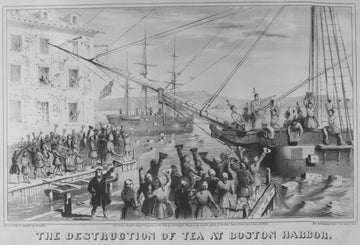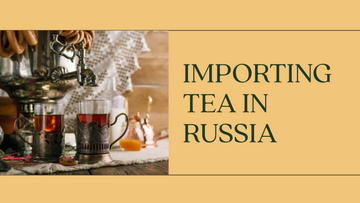
"Can Tea Make You Stress-Free?" - Of course.
"Can Tea Energize You?" - Definitely.
"Can It Improve Your Immunity, Brain Function, and Help Maintain Weight?" - YES.
"Can Tea Act as a Pivot to a Revolution Which Helps in Gaining Freedom from Colonists?" - Wait, What?
The Boston Tea Party says that the answer to this question is a big YES!
How, you ask? Read on.
The Boston Tea Party stands as a defining moment in American history, an act of protest that ignited the flames of revolution. A courageous act of defiance against British oppression, this pivotal event played a crucial role in shaping the course of the American Revolution. Join us as we delve into the events leading up to the Boston Tea Party, the incident itself, and its profound impact on the quest for American independence.
Tensions Rise: The Seeds of Discontent
In the years leading up to the Boston Tea Party, tensions between the American colonists and British authorities were mounting. The British Parliament had imposed a series of punitive acts and taxes on the colonies, seeking to assert its control and recuperate war debts from the French and Indian War. The Stamp Act of 1765, the Townshend Acts of 1767, and other measures only fueled the colonists' resentment, leading to growing dissent and calls for liberty and representation.
The Tea Act of 1773: A Catalyst for Rebellion
In an attempt to rescue the struggling British East India Company, Parliament passed the Tea Act of 1773. This act granted the company a monopoly on tea sales to the American colonies, allowing them to sell directly to colonial merchants without paying the usual duties and tariffs.
While the Tea Act made tea more affordable for the colonists, it was seen as a clever ploy to assert British authority and force the colonists to accept taxation without representation. Outraged by the perceived infringement on their rights, many colonists vowed not to accept tea from the British East India Company, boycotting the commodity as a matter of principle.
The Fateful Night: December 16, 1773
As the deadline to accept the East India Company's tea shipment neared, tensions in Boston reached a boiling point. On the night of December 16, 1773, a group of colonists, disguised as Native Americans, boarded three British ships - the Dartmouth, the Eleanor, and the Beaver - that were docked in Boston Harbor. Determined to send a powerful message to the British Crown, the protesters set their sights on destroying the controversial tea cargo.
Amidst the chilly darkness, 342 chests of tea were dumped into the harbor, causing substantial financial losses to the East India Company. This audacious act of defiance, the Boston Tea Party, would reverberate throughout the colonies and lay the groundwork for the American Revolution.
Repercussions and Legacy
The British government responded to the Boston Tea Party with fury. The Coercive Acts, also known as the Intolerable Acts, were enacted in 1774 as punitive measures against Boston. These acts further restricted civil liberties and autonomy, closing the port of Boston and tightening British control over Massachusetts.
Instead of quelling rebellion, these harsh measures had the opposite effect. The Coercive Acts united the colonies in their opposition to British tyranny, leading to the convening of the First Continental Congress in 1774, where delegates from twelve colonies gathered to devise a unified response.
The Boston Tea Party became a symbol of resistance and fueled the call for independence. It demonstrated the colonists' determination to stand united against unjust laws and served as a rallying cry for the fight for freedom and representation.
Brew a cup of Courage and strength, get it from mittalteas.com




